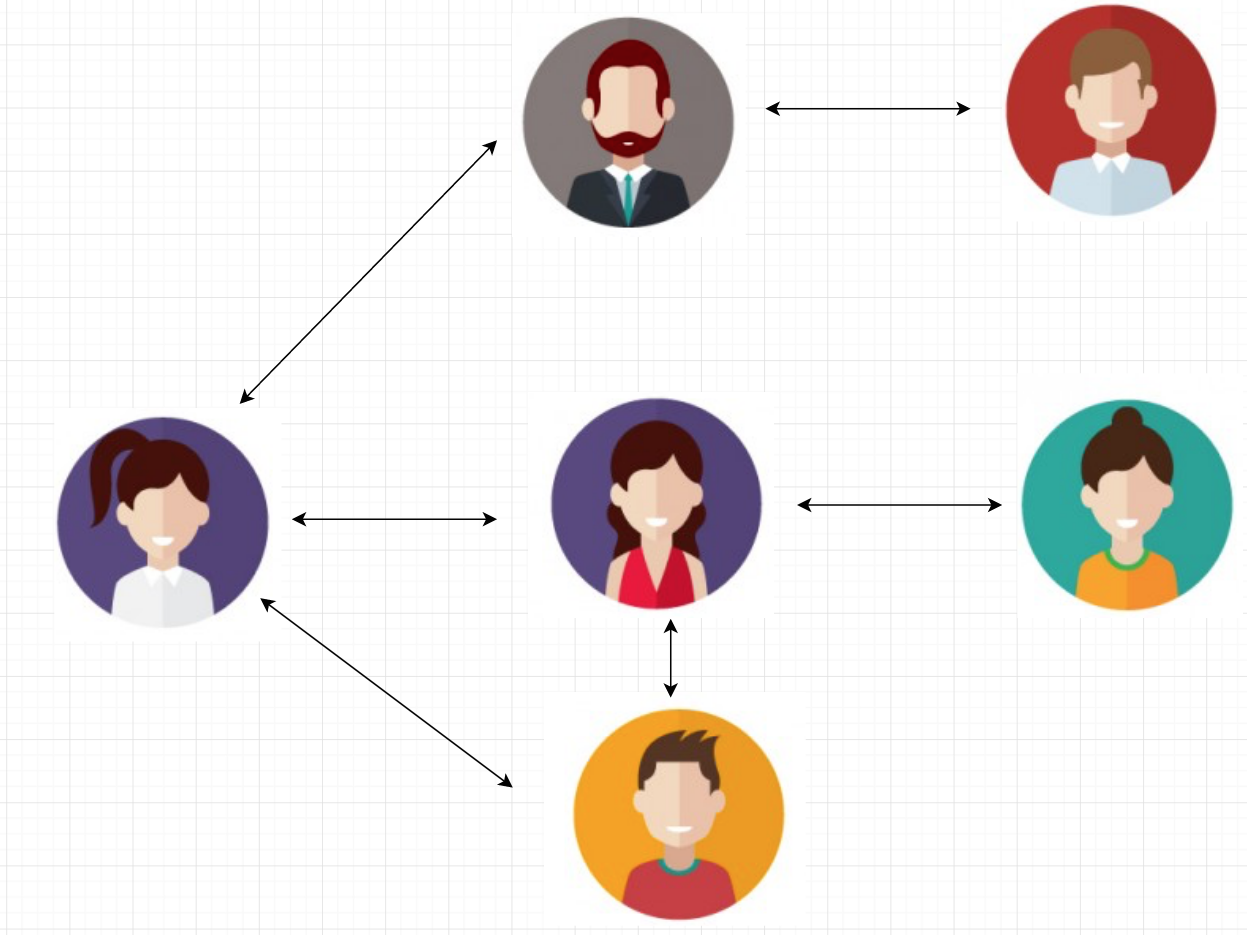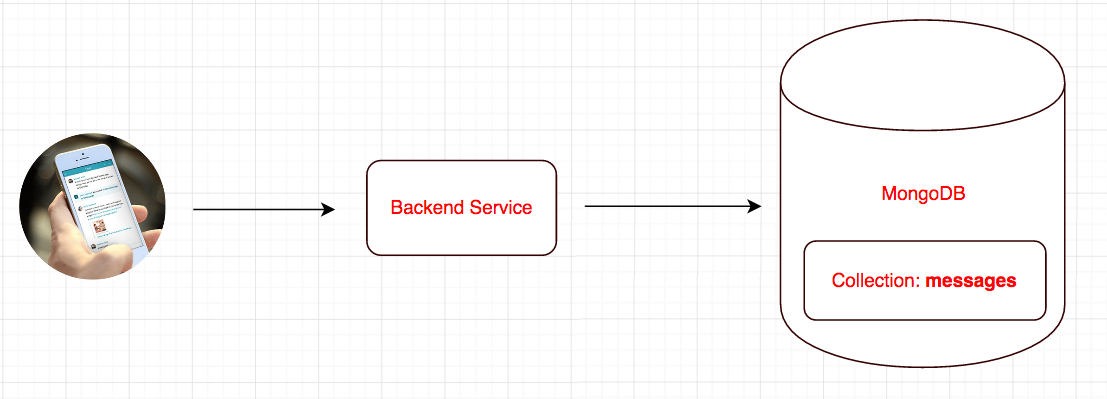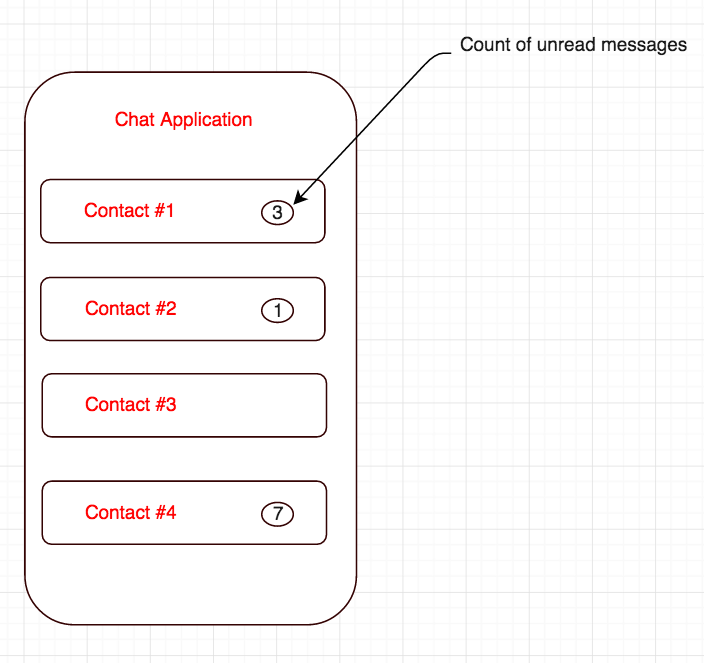MongoDB Query Examples
In this blog, I will explain with examples the common queries and operation that can be executed on a MongoDB collection.
Let consider a scenario where we have a messaging APP and all of the users communication are stored in MongoDB


We have a collection named "messages" in MongoDB. Below is a sample documents that are stored in the collection:
{
"_id": "582a15149bbc2d2f8898628b",
"senderUserId": 1234,
"receiverUserId": 7890,
"message": Hi, How are you?,
"sentDate": ISODate("2016-11-14T19:48:36.379Z"),
"read": false
},
{
"_id": "722a15149bbc4d2f8898628b",
"senderUserId": 7890,
"receiverUserId": 1234,
"message": "I am doing well. How about you?",
"sentDate": ISODate("2016-11-15T2:10:11.123Z")
"read": true
}, {
"_id": "150000149bb42d2f8898628b",
"senderUserId": 5678,
"receiverUserId": 2222,
"message": "Hola !!!",
"sentDate": ISODate("2016-11-17T01:04:6.079Z"),
"read" : false
}
Query #1 - Create document (User sends a message to another user)
db.getCollection('messages').insertOne({
"_id": "582a15149bbc2d2f8898628b",
"senderUserId": "1234",
"receiverUserId": "7890",
"message": "Hi, How are you?",
"sentDate": ISODate("2016-11-14T19:48:36.379Z"),
"read": false
})
Query #2 - Message history between two users with the most recent message at the bottom
db.getCollection('messages').find({
$or: [{
senderUserId: 1234,
receiverUserId: 7890
}, {
senderUserId: 7890,
receiverUserId: 1234
}]
}).sort({
sentDate: 1
})
Query #3 - Retrieve all messages received by an user from other users and which are still unread by the receiving user
db.getCollection('messages').find({
receiverUserId: 1234,
read: false
}).sort({
sentDate: 1
})
Query #4 - Retrieve all messages sent by an user to other users
db.getCollection('messages').find({
senderUserId: 1234,
}).sort({
sentDate: 1
})
Query #5 - Retrieve count of all messages sent by the user till date
db.getCollection('messages').find({
senderUserId: 1234,
}).count()
Query #6 - Retrieve grouped count of unread messages per contact

db.getCollection('messages').aggregate([{
$match: {
receiverUserId: 1234
}
},
{
$group: {
_id: "$senderUserId",
count: {
$sum: 1
}
}
}
])
db.getCollection('messages').aggregate([{
$match: {
receiverUserId: 1234
}
},
{
$sort: {
sentDate: -1
}
}, {
$group: {
_id: "$senderUserId",
count: {
$sum: 1
},
sentDate: {
$first: "$sentDate"
}
}
}
,
{
$sort: {
sentDate: -1
}
}, {
$project: {
_id: 1,
count: 1
}
}
])
Query #7: Get a unique list of Ids of all people that the user sent messages to
db.getCollection('messages').aggregate([{
$match: {
senderUserId: 1234
}
}, {
$group: {
"_id": "$receiverUserId"
}
}, {
$project: {
"receiverUserId": "$_id",
"_id": 0
}
}
]);
Query #7: Count of messages sent by the user to each of the contacts
db.getCollection('messages').aggregate([{
$match: {
senderUserId: 1234
}
}, {
$group: {
"_id": "$receiverUserId",
count: {
$sum: 1
}
}
},
{
$project: {
"receiverUserId": "$_id",
"_id": 0,
count: 1
}
}
]);
Query #8: Get paginated list of messages sent between an user and another user [ Pagination Approach #1: Using pageSize and pageNum ]
db.getCollection('messages').find({
senderUserId: 1234,
receiverUserId: 7890
}).sort({sentDate:-1}).skip(0).limit(10) // Fetch the first page of the paginated messages. Each page will have 10 messages
db.getCollection('messages').find({
senderUserId: 1234,
receiverUserId: 7890
}).sort({sentDate:-1}).skip(10).limit(10) // Fetch the second page of the paginated messages.
General format :
db.getCollection('messages').find({
senderUserId: 1234,
receiverUserId: 7890
}).sort({sentDate:-1}).skip(pageNum-1 * pageSize ).limit(pageSize) // General format for fetching messages
Query #9: Get list of messages sent between an user and another match [Pagination Approach #2 : Range based pagination]
// Fetch 10 messages that were exchanged between the users before the provided time frame.
db.getCollection('messages').find({
senderUserId: 1234,
receiverUserId: 7890,
sentDate: {
$lt: ISODate("2016-11-14T19:48:36.379Z")
}
}).sort({
sentDate: -1
}).limit(10)
// Fetch 10 messages that were exchanged between the users after the provided time frame.
db.getCollection('messages').find({
senderUserId: 1234,
receiverUserId: 7890,
sentDate: {
$gt: ISODate("2016-11-14T19:48:36.379Z")
}
}).sort({
sentDate: 1
}).limit(10)
Query #10: Update messages received by an an user from another user as read.
db.getCollection('messages').update({
receiverUserId: 1234,
senderUserId: 7890,
read: false
}, {
$set: {
read: true
}
}, {
multi: true
})